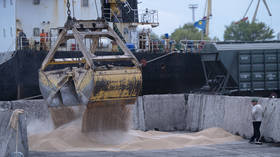Moscow hints at fate of grain deal
Russian food and fertilizer exports must be unblocked, deputy FM Vershinin has said
The Black Sea Initiative will end on May 18 unless the UN lives up to its part of the deal and enables the export of Russian grain and fertilizer, Russia’s Deputy Foreign Minister Sergey Vershinin said on Thursday.
Last year’s agreement, brokered by the UN and Türkiye, provided for safe export of Ukrainian grain though Black Sea corridors, while requiring the US and EU to remove obstacles to Russian exports. The West has argued it had never embargoed grain and fertilizer to begin with, while Moscow has pointed to their shipping, insurance and brokerage sanctions as the problem.
“If Russia doesn’t receive guarantees, including for fertilizer, the Black Sea initiative is over,” Vershinin told reporters in Istanbul, after two-day talks on the future of the arrangement. There is “no sense or point for Russia to participate” in the deal unless its interests are protected, the diplomat added.
So far, “no concrete results” on enabling Russian exports have been achieved, said Vershinin. Moscow has agreed to extend the deal through May 18, but not indefinitely.
“There is still some time left” to reach an agreement, he said.
Among the specific steps that needed to be taken, Moscow has demanded the reconnection of the Russian Agricultural Bank (Rosselkhozbank) to the international SWIFT payment system.
Russia “can’t put up with double standards” under which only the part of the agreement pertaining to Ukraine gets observed, Vershinin said. He accused the UN and the West of helping Kiev fill its pockets under the guise of “loud noises about the need to ensure food security” around the world.
Ukraine had originally accused Russia of blockading its grain exports and causing starvation in Africa and parts of Asia. However, Russian grain and fertilizer exports accounted for a much greater share of the world market.
Vershinin noted that the bulk of Ukraine’s grain ended up going to “countries that are well-fed or with a high level of income” instead. In February, one Austrian outlet reported that almost half of all Ukrainian wheat and corn exported to the EU went to Spain, where it was used as pig fodder by producers of the world-famous Spanish ham.
You can share this story on social media:








Comments are closed.